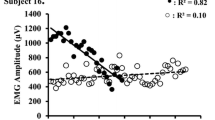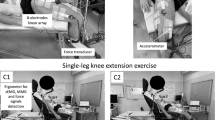Abstract
The surface mechanomyogram (MMG) (detectable at the muscle surface as MMG by accelerometers, piezoelectric contact sensors or other transducers) is the summation of the activity of single motor units (MUs). Each MU contribution is related to the pressure waves generated by the active muscle fibres. The first part of this article will review briefly the results obtained by our group studying the possible role of motor unit recruitment and firing rate in determining the characteristics of the MMG during stimulated and voluntary contractions. The second part of this article will study the MMG and EMG during a short isometric force ramp from 0 to 90% of the maximal voluntary contraction (MVC) in fresh and fatigued biceps brachii. The aim is to verify whether changes in motor unit activation strategy in voluntarily fatigued muscle could be specifically reflected in the time and frequency domain parameters of the MMG. MMG-RMS vs. %MVC: at fatigue the MMG-RMS did not present the well known increment, when effort level increases, followed by a clear decrement at near-maximal contraction levels. MMG-MF vs. %MVC: compared to fresh muscle the fatigued biceps brachii showed an MF trend significantly shifted towards lower values and the steeper MF increment, from 65 to 85% MVC, was not present. The alteration in the MMG and EMG parameters vs. %MVC relationships at fatigue seems to be related to the impossibility of recruiting fast, but more fatigable MUs, and to the lowering of the global MUs firing during the short isometric force ramp investigated.








Similar content being viewed by others
References
Akataki K, Mita K, Itoh Y (1999) Relationship between mechanomyogram and force during voluntary contractions reinvestigated using spectral decomposition. Eur J Appl Physiol 80:173–179
Akataki K, Mita K, Watakabe M, Itoh K (2001) Mechanomyogram and force relationship during voluntary isometric ramp contractions of the biceps brachii muscle. Eur J Appl Physiol 84:19–25
Akataki K, Mita K, Watakabe M, Itoh K (2002) Age-related change in motor unit activation strategy in force production: a mechanomygraphic investigation. Muscle Nerve 25:505–512
Allum JH, Dietz V, Freund HJ (1978) Neuronal mechanisms underlying physiological tremor. J Neurophysiol 41:557–571
Barry DT, Geiringer SR, Ball RD (1985) Acoustic myography: a noninvasive monitor of motor unit fatigue. Muscle Nerve 8:189–194
Baselli G, Porta A, Diemont B, Campa I, Galesi M, Orizio C (2002) Accelerometric and optical mechanomyogram in spectral and information domains: isometric load and fatigue. Proceedings of IV International Workshop on Biosignal Interpretation. BSI 2002; pp 71–74
Basmajian JV, De Luca CJ (1985) Muscle alive. Their functions revealed by electromyography. Williams and Wilkins, Baltimore
Bichler E (2000) Mechanomyograms recorded during evoked contractions of single motor units in the rat medial gastrocnemius muscle. Eur J Appl Physiol 83:310–319
Bilodeau M, Arsenault AB, Gravel D, Bourbonnais D (1990) The influence of an increase in the level of force on the EMG power spectrum of elbow extensors. Eur J Appl Physiol 61:461–466
Blinowska A, Verroust J, Cannet G (1980) An analysis of synchronization and double discharge effects on low frequency electromyographic power spectra. Electromyogr Clin Neurophysiol 20(6):465–480
Clamann HP (1970) Activity of single motor units during isometric tension. Neurology 20:254–260
De Luca CJ, Erim Z (1994) Common drive of motor units in regulation of muscle force. Trends Neurosci 17(7):299–305
Diemont B, Maranza Figini M, Orizio C, Perini R, Veicsteinas A (1988) Spectral analysis of muscular sound at low and high contraction level. Int J Biomed Comput 23:161–175
Enoka RM, Stuart DG (1992) Neurobiology of muscle fatigue. J Appl Physiol 72(5):1631–1648
Erim Z, De Luca CJ, Mineo K, Aoki T (1996) Rank-ordered regulation of motor units. Muscle Nerve 19:563–573
Esposito F, Orizio C, Veicsteinas A (1998) Electromyogram and mechanomyogram changes in fresh and fatigued muscle during sustained contraction in men. Eur J Appl Physiol 78:494–501
Fallentin N, Jorgensen K, Simonsen EB (1993) Motor unit recruitment during prolonged isometric contractions. Eur J Appl Physiol 67:335–341
Farina D, Fosci M, Merletti R (2002) Motor unit recruitment strategies investigated by surface EMG variables J Appl Physiol 92:235–247
Freund HJ (1983) Motor unit and muscle activity in voluntary motor control. Physiol Rev 63:387–436
Gamet D, Maton B (1989) The fatigability of two agonistic muscles in human isometric voluntary submaximal contraction: an EMG study. I. Assessment of muscular fatigue by means of surface EMG. Eur J Appl Physiol 58:361–368
Goldenberg MS, Yack HJ, Cerny FJ, Burton HW (1991) Acoustic myography as an indicator of force during sustained contractions of a small hand muscle. J Appl Physiol 70(1):87–91
Gordon G, Holbourn HS (1948) The sounds from single motor units in a contracting muscle. J Physiol (Lond) 107:456–464
Grimby L (1986) Single motor unit discharge during voluntary contraction and locomotion. In: Jones NL, McCartney N, McComas RJ (eds) Human muscle power. Human Kinetics, Champaign, Ill., pp 111–122
Hermens HJ, v. Bruggen TAM, Baten CTM, Rutten WLC, Boom HBK (1992) The median frequency of the surface EMG power spectrum in relation to motor unit firing and action potential properties. J Electromyogr Kinesiol 2:15–25
Homberg V, Reiners K, Hefter H, Freund HJ (1986) The muscle activity spectrum: spectral analysis of muscle force as an estimation of overall motor unit activity. Electroencephalogr Clin Neurophysiol 63:209–222
Johnson MA, Polgar R, Weightman D, Appleton D (1973) Data on the distribution of fibre types in thirty-six human muscles. An autopsy study. J Neurol Sci 173(18):111–129
Kamen G, Roy A (2000) Motor unit synchronization in young and elderly adults. Eur J Appl Physiol 81:403–410
Keidel M, Keidel W-D (1989) The computer-vibromyography as a biometric progress in studying muscle function. Biomedizinische Technik 34:107–116
Krogh-Lund C, Jorgensen K (1993) Myoelectric fatigue manifestations revised: power spectrum, conduction velocity and amplitude of human elbow flexor muscles during isolated and repetitive endurance contractions at 30% maximal voluntary contraction. Eur J Appl Physiol 66:161–173
Kukulka CG, Clamann HP (1981) Comparison of the recruitment and discharge properties of motor units in human brachial biceps and adductor pollicis during isometric contractions. Brain Res 219:45–55
Lammert O, Jorgensen F, Einer-Jensen N (1976) Accelerometermyography (AMG) I: method for measuring mechanical vibrations from isometrically contracted muscles. Biomechanics V-A, Park Press, Baltimore University, pp 152–156
Marsden CD, Meadows JC, Merton PA (1983) "Muscular wisdom" that minimizes fatigue during prolonged effort in man: peak rates of motoneuron discharge and slowing of discharge during fatigue. In: Desmedt JE (ed) Advances in neurology. Raven, New York, pp 169–212
Moritani T, Muro M (1987) Motor unit activity and surface electromyogram power spectrum during increasing force of contraction. Eur J Appl Physiol 56(3):260–265
Orizio C (1992) Sound myogram and EMG cross-spectrum during exhausting isometric contractions in humans. J Electromyogr Kinesiol 2:141–149
Orizio C (1993) Muscle sound: bases for the introduction of a mechanomyographic signal in muscle studies. Crit Rev in Biomed Eng 21(3):201–243
Orizio C (2000) Muscle fatigue monitored by the force, surface mechanomyogram and EMG. In: Nigg BM, MacIntosh BR, Mester J (eds) Mechanics and biology of movement, Chapter 21. Human Kinetics, Champaign, Ill., pp 409–433
Orizio C, Veicsteinas A (1992) Soundmyogram analysis during sustained maximal voluntary contraction in sprinters and long distance runners. Int J Sports Med 13(8):594–599
Orizio C, Perini R, Veicsteinas A (1989) Muscular sound and force relationship during isometric contraction in man. Eur J Appl Physiol 58:528–533
Orizio C, Perini R, Diemont B, Maranzana Figini M, Veicsteinas A (1990) Spectral analysis of muscular sound during isometric contraction of biceps brachii. J Appl Physiol 68(2):508–512
Orizio C, Perini R, Diemont B, Veicsteinas A (1992) Muscle sound and electromyogram spectrum analysis during exhausting contractions in man. Eur J Appl Physiol 65:1–7
Orizio C, Solomonow M, Baratta R, Veicsteinas A (1993) Influence of motor units recruitment and firing rate on the soundmyogram and EMG characteristics in cat gastrocnemius. J Electryogr Kinesiol 2(4):232–241
Orizio C, Liberati D, Locatelli C, De Grandis D, Veicsteinas A (1996) Surface mechanomyogram reflects muscle fibres twitches summation. J Biomech 29(4):475–481
Orizio C, Baratta R, Zhou BH, Solomonow M, Veicsteinas A (1999) Force and surface mechanomyogram relationship in cat gastrocnemius. J Electromyogr Kinesiol 9:131–140
Orizio C, Baratta RV, Zhou BH, Solomonow M, Veicsteinas A (2000) Force and surface mechanomyogram frequency responses in cat gastrocnemius. J Biomech 33:427–433
Oster G (1984) Muscle sounds. Sci Am 250:80–88
Oster G, Jaffe JS (1980) Low frequency sounds from sustained contractions of human skeletal muscle. Biophys J 30:119–128
Partridge LD, Benton LA (1981) Muscle the motor. In: Brookhart JM, Mountcastle VB, Brooks VB (eds) Handbook of physiology, section 1. The nervous system II. Motor control, part 1. American Physiological Society, Bethesda, Md., pp 43–106
Petitjean M, Maton B (1995) Phonomyogram from single motor units during voluntary isometric contraction. Eur J Appl Physiol 71:215–222
Rodriquez AA, Agre JC, Knudtson ER, Franke TM, Ng AV (1993) Acoustic myography compared to electromyography during isometric fatigue and recovery. Muscle Nerve 16(2):188–192
Rodriquez AA, Agre JC, Franke TM, Swiggum ER, Curt JT (1996) Acoustic myography during isometric fatigue in postpolio and control subjects. Muscle Nerve 19:384–387
Roeleveld K, van Engelen BG, Stegeman DF (2000) Possible mechanisms of muscle cramp from temporal and spatial surface EMG characteristics. J Appl Physiol 88(5):1698–1706
Sale DG (1987) Influence of exercise and training on motor unit activation. Exerc Sport Sci Rev 15:95–151
Sanchez J, Solomonow M, Baratta R, D'Ambrosia R (1993) Control strategies of the elbow antagonist muscle pair during two types of increasing isometric contraction. J Electromyogr Kinesiol 3:33–40
Shinoara M, Kouzaki M, Yoshihisa T, Fukunaga T (1998) Mechanomyogram from the different heads of the quadriceps muscle during incremental knee extension. Eur J Appl Physiol 78:289–295
Stiles R, Pham D (1991) In: Proceedings IEEE-EMBS, 13th Annual International Conference. IEEE, New York, pp 946–947
Stokes MJ, Blythe M (2001) Muscle sounds in physiology, sports science and clinical investigation. Applications and history of mechanomyography. Medintel Monographs, Oxford
Yoshitake Y, Moritani T (1999) The muscle sound properties of different muscle fiber types during voluntary and electrically induced contractions. J Electromyogr Kinesiol 9:209–217
Zwarts MJ, Keidel M (1991) Relationship between electrical and vibratory output of muscle during voluntary contraction and fatigue. Muscle Nerve 14:756–761
Acknowledgements
This work was supported by "Centro di Studio e Ricerca di Fisiologia Muscolare e dello Sport" of Brescia University (Italy) and by the European Shared cost project NEW-Neuromuscular assessment in Elderly Worker (QLRT-2000–00139). The experiments comply with the current Italian laws.
Author information
Authors and Affiliations
Corresponding author
Rights and permissions
About this article
Cite this article
Orizio, C., Gobbo, M., Diemont, B. et al. The surface mechanomyogram as a tool to describe the influence of fatigue on biceps brachii motor unit activation strategy. Historical basis and novel evidence. Eur J Appl Physiol 90, 326–336 (2003). https://doi.org/10.1007/s00421-003-0924-1
Accepted:
Published:
Issue Date:
DOI: https://doi.org/10.1007/s00421-003-0924-1




